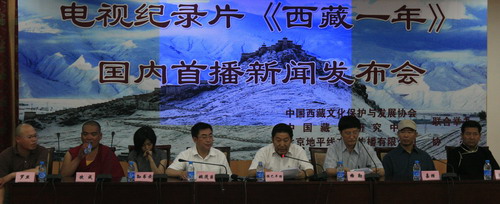
The premier ceremony held on Thursday in Beijing, photo from CTIC by Mirenda Wu.
A five-episode documentary series "A Year in Tibet" tracking eight Tibetans' life will soon be broadcasted on CCTV, Phoenix Satellite Television and other Chinese TV channels after it provoked strong reactions when shown on BBC in March 2008.
"A Year in Tibet", consisting of five episodes, tells a whole year's life about eight ordinary Tibetan people, who were born and now living in and around the magical and unfamiliar Gyangze County of Tibet.
The eight people include a woman cadre, a village doctor, a restaurant boss, a pedicab driver, a lama in Palkor Monastery, a hail suppression lama and a labor contractor.
Sun Shuyun, the director of the documentary, who also published a cognominal book both in English and Chinese, said :"We direct nothing, but just record what we have seen and heard from those people. The real directors are the eight Tibetans themselves."
Sun thanked the eight Tibetans in the premier ceremony held on Thursday in Beijing for giving her a chance to show the world the real life of Tibetan people and enabling more people to understand the culture of Tibet.
Lhakpa Phuntsok, director-general of China Tibetology Research Center, said the religionary activities in the film objectively reflected the freedom of religion belief in Tibet, "when the 11th Panchen Erdini Gyaincain Norbu paid an unexpected visit to the Palkor Monastery, he received warm welcome and won wide resepcts from the locals. "
The documentary was firstly shown on BBC in March 2008 and soon aroused worldwide attention and rovoked strong reactions. Over the last one year, the film has been thrice boardcasted in Britain alone.
British major media like The Times, The Guardian and The Daily Telegraph spoke highly of the film and recommended it to local people as a good film to introduce Tibet.
"It is a documentary that has never been recorded and will never been forgotten," the British Broadcasting Weekly said.
The Guardian also judged it as a film "to objectively record the real life of people who live in the most contentious remote area."
"I become a bit famous when the film was shown abroad, " Jiangzang, the restaurant runner in the documentary, who firstly visited Beijing, said tourists from abroad recognized him and often invited him to take photos with them.
Jiangzang said the film just reflects his real life, not makeup.
Moreover, the documentary was respecitvely shown in America, France, Germany, Spain, Norway, Argentina, Iran, Saudi Arabia, Israel, South Africa and other 40 countries and regions.
According to the premier ceremony, the actual date of broadcast in China is still up in the air, but may be "soon".
